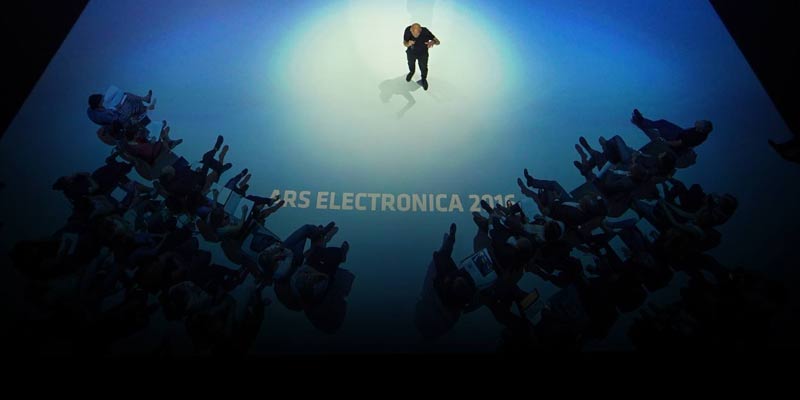First Theme Weekend at the New Ars Electronica Center
press release as PDF
photos on Flickr
opening-video on Youtube
hyperlapse-video of the resconstruction on Youtube
Compass – Navigating the Future / exhibition
(Linz, June 3, 2019) Watch artificial intelligence (AI) “think”, train self-propelled cars or program robots with face recognition. The new Ars Electronica Center starts its opening program, which will last several weeks, with a first theme weekend that is clearly dedicated to AI. Experts from the Ars Electronica Futurelab, Johannes Kepler University and Hagenberg University of Applied Sciences will show what can be achieved with AI applications today, explain the areas in which they are used, and shed light on future potential and risks. Already on Thursday evening, June 6, 2019, 8 p.m., Deep Space LIVE will be dedicated to AI and the revolution behind the hype.
THU June 6, 2019, 7 p.m. – 8:30 p.m. / lecture
Deep Space LIVE: Artificial Intelligence – The Revolution Behind the Hype
Artificial intelligence has many faces and they all guarantee attention. Horst Hörtner, Ali Nikrang and Nicole Grüneis (all Ars Electronica) will talk about the revolution behind the hype of artificial intelligence from 7 p.m. Afterwards Eckhard Hermann and Alexander Aigner (both FH Hagenberg) will talk about AI-based modifications of video streams from surveillance cameras. Finally, Johannes Kofler (JKU) gives an overview of the topic of artificial intelligence.
FRI June 7, 2019, 3 p.m. – 3:30 p.m / lecture & short tour
Making-of Understanding Artificial Intelligence
Peter Freudling and Stefan Mittlböck-Jungwirth-Fohringer from the Ars Electronica Futurelab will be giving a guided tour of the new exhibition “Understanding Artificial Intelligence”, giving insights into its genesis and development. During the tour, visitors experience how artificial neuronal networks transform hand sketches into cat images and encounter two puppets whose movements are controlled by industrial robots.
SAT June 8 and SUN June 9, 2019 / 11:00 a.m. – 11:30 a.m. / lecture
AI-based real-time object detection
Deep learning enables impressive solutions for real-time analysis of video streams. Alexander Aigner from the FH-Hagenberg talks about the use of Deep Learning based methods for object recognition, explains what data is needed to train such object recognition and how reliable these methods are.
SAT June 8, 2019, 3 p.m. – 3:30 p.m. / lecture & short tour
Making-of Understanding Artificial Intelligence
After a brief presentation at Deep Space 8K, Susanne Teufelauer and Arno Deutschbauer from the Ars Electronica Futurelab will provide insights into the genesis and development of the exhibition “Understanding Artificial Intelligence.
SAT June 8 and SUN June 9, 2019, 2 p.m. – 3. p.m. / lecture & showcase
AI-based modification of video streams from surveillance cameras
Deep learning enables impressive solutions for real-time analysis of video streams, for example in object recognition. The use of Deep Learning based methods in the context of video surveillance combined with traditional attack methods holds a potential danger that should not be underestimated. The lecture will also present a scenario in which these methods are demonstrated from an attacker’s point of view.
SAT June 8, 2019, 4 p.m. – 4:30 p.m. / lecture
Artificial Intelligence – explained in 25 minutes
Philip Winter of JKU explains the basics of artificial intelligence to visitors – from the most important terms such as neural networks to machine learning and various application examples.
SUN June 9, 2019, 11 a.m. – 11:30 a.m. / lecture & short tour
Behind the Scenes of Creative AI
Ali Nikrang of the Ars Electronica Futurelab tells in Deep Space 8K how Artificial Intelligence is used in the field of art, and during a guided tour of the exhibition “Understanding Artificial Intelligence” he shows a series of artistic works with this context, including an installation that transforms the silhouettes of visitors into mountains and landscapes.
SUN June 9, 2019, 4 p.m. – 4:30 p.m. / lecture
Artificial Intelligence – explained in 25 minutes
Bernhard Nessler from JKU explains the basics of artificial intelligence to visitors – from the most important terms to various application examples.
FRI June 7 2019, 2 p.m.; SAT June 8 and SUN June 9, 2019, 10:30 a.m. and 2 p.m. / guided tours
Understanding Artificial Intelligence
Guided tours through the exhibition “Understanding Artificial Intelligence” provide an insight into the topic of artificial intelligence and show in which areas it is already being used. Visitors will learn how machines and their sensors “perceive” the world in comparison to humans, what machine learning is and how automatic face recognition works.
Family Tour (for children 6-10 years) (duration: 45 min.)
FRI June 7, 2019, 2:30 p.m.; SAT June 8 and SUN June 9, 2019, 11:30 a.m. and 2:30 p.m. / guided tour
Family tours through the new exhibitions introduce families to the topic of artificial intelligence in a child-friendly way. For example, in the GauGAN application, photorealistic landscapes can be designed according to one’s own ideas by simply stroking with one’s fingers. This is made possible by a Generative Adversarial Network working in the background.
FRI June 7, 2019, 3:30 p.m., SAT June 8 and SUN June 9, 2019, 11:30 p.m. and 3:30 p.m. / workshops
Machine Learning for children aged 10 and over
In the Machine Learning Studio, young and old learn how machines learn and perceive their environment. Self-propelled model cars are built, trained and robots programmed with face recognition together with techtrainers.
http://www.flickr.com/photos/arselectronica/47959568261/
Neural Network Training / Ars Electronica Futurelab // Fotocredit: Florian Voggeneder / Printversion
http://www.flickr.com/photos/arselectronica/47964772523/
ShadowGAN / Ars Electronica Futurelab (AT) // Fotocredit: Ars Electronica / Robert Bauernhansl / Printversion
http://www.flickr.com/photos/arselectronica/47965586121/
Machine Learning Studio // Fotocredit: Ars Electronica / Robert Bauernhansl / Printversion
http://www.flickr.com/photos/arselectronica/47958954577/
SEER: Simulative Emotional Expression Robot / Takayuki Todo (JP) // Fotocredit: Florian Voggeneder / Printversion
http://www.flickr.com/photos/arselectronica/47957268871/
pinocchio // Fotocredit: Florian Voggeneder / Printversion
http://www.flickr.com/photos/arselectronica/47965585856/
Neural Network Training / Ars Electronica Futurelab // Fotocredit: Ars Electronica / Robert Bauernhansl / Printversion

